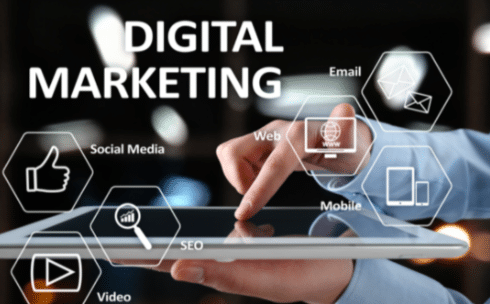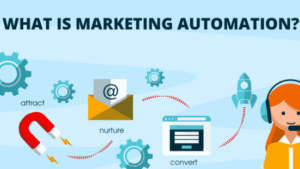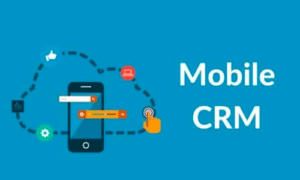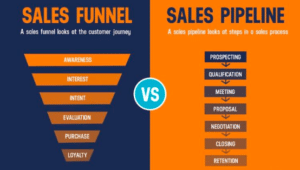Digital marketing has become the lifeblood of modern businesses, transforming the way they connect with their audience, promote products and services, and drive growth. In this ever-evolving digital landscape, understanding and harnessing the power of digital marketing has become paramount for success. The journey of digital marketing begins with understanding its core concept, strategies, and tools. So, “What is Digital Marketing?” Let’s dive in and explore the exciting world of digital marketing together.
What is Digital Marketing?

Digital marketing refers to the use of various digital channels and technologies to promote products, services, and brands to a target audience. These channels include search engines, social media platforms, websites, email, mobile apps, and more. The goal of digital marketing is to reach potential customers where they spend significant time – online.
The Benefits of Digital Marketing: Why It Matters for Businesses
Digital marketing offers a plethora of benefits for businesses looking to make their mark in the digital world. Some of the key advantages include:
- Global Reach: With the internet’s expansive reach, businesses can connect with audiences worldwide, transcending geographical boundaries.
- Cost-Effectiveness: Compared to traditional advertising methods, digital marketing offers a more budget-friendly approach with higher ROI potential.
- Personalization: Digital marketing enables tailored and personalized content to resonate with individual customers, enhancing engagement.
- Real-Time Analytics: The ability to measure and analyze marketing efforts in real-time empowers businesses to make data-driven decisions and optimize their campaigns.
The Key Components of Digital Marketing
Digital marketing encompasses a wide array of components that work together to achieve business goals. Understanding these components is essential for crafting effective digital marketing strategies. Let’s explore the key components:
1. Search Engine Optimization (SEO)
SEO is the process of optimizing a website to rank higher in search engine results pages (SERPs). By leveraging relevant keywords, creating quality content, and building backlinks, businesses can improve their online visibility and attract organic traffic.
2. Social Media Marketing
Social media marketing involves leveraging social media platforms to engage with the audience, build brand awareness, and foster meaningful relationships. Platforms like Facebook, Twitter, Instagram, and LinkedIn serve as powerful channels to connect with potential customers.
3. Content Marketing
Content marketing revolves around creating and distributing valuable, informative, and relevant content to attract and retain customers. This may include blog posts, articles, videos, infographics, and more.
4. Email Marketing
Email marketing involves sending targeted messages directly to a subscriber’s inbox. It is an effective way to nurture leads, promote products, and build brand loyalty.
5. Pay-Per-Click Advertising (PPC)
PPC advertising allows businesses to display ads on search engines and other platforms and pay only when users click on their ads. This model provides a cost-effective way to drive traffic and conversions.
6. Affiliate Marketing
Affiliate marketing involves collaborating with other businesses or individuals (affiliates) to promote products or services. Affiliates earn a commission for each successful referral.
7. Influencer Marketing
Influencer marketing relies on partnerships with social media influencers to expand brand reach and credibility. Influencers share their experiences and recommendations with their followers, influencing purchasing decisions.
8. Mobile Marketing
With the growing use of mobile devices, mobile marketing focuses on targeting users on smartphones and tablets through mobile apps, SMS, and push notifications.
9. Online PR (Public Relations)
Online PR involves managing a brand’s online reputation, engaging with the media, and fostering positive public perception through digital channels.
10. Analytics and Data Insights
Data analytics provides valuable insights into customer behavior, campaign performance, and overall marketing effectiveness. This data-driven approach enables businesses to refine their strategies and achieve better results.
Exploring Emerging Trends in Digital Marketing
As technology evolves, so does the landscape of digital marketing. Staying ahead of emerging trends is crucial for businesses to maintain their competitive edge. Some of the noteworthy trends to watch out for include:
1. Voice Search Optimization
With the rise of virtual assistants like Siri and Alexa, voice search optimization is becoming a vital aspect of SEO. Businesses need to optimize their content to answer voice queries effectively.
2. Video Marketing Dominance
Videos have emerged as a dominant form of content consumption. Businesses must invest in video marketing to capture the attention of their audience and convey messages effectively.
3. Augmented Reality (AR) Experiences
AR technology allows businesses to create interactive and immersive experiences for users, enhancing brand engagement and customer experience.
4. Chatbots and AI-powered Customer Support
Chatbots and AI-powered customer support offer round-the-clock assistance to customers, improving response times and customer satisfaction.
5. Personalization through Big Data
Leveraging big data enables businesses to deliver highly personalized experiences to their customers, leading to increased loyalty and conversions.
FAQs:
- Q: What is the significance of digital marketing in the modern business landscape? A: Digital marketing plays a vital role in helping businesses reach their target audience online, enhance brand visibility, and drive sales.
- Q: How can businesses measure the effectiveness of their digital marketing campaigns? A: Businesses can use various analytics tools to measure key performance indicators (KPIs) such as website traffic, conversion rates, and social media engagement.
- Q: Is digital marketin suitable for small businesses with limited budgets? A: Absolutely! Digital marketing offers cost-effective strategies that allow small businesses to compete with larger ones on a level playing field.
- Q: How can businesses utilize social media marketing to their advantage? A: By understanding their target audience, businesses can create engaging content, interact with customers, and build a loyal community around their brand.
- Q: What are some common mistakes to avoid in digital marketin? A: Businesses should avoid neglecting SEO, overspending on irrelevant ads, and disregarding the importance of customer feedback and reviews.
- Q: How does content marketing contribute to brand credibility? A: By providing valuable and informative content, businesses can position themselves as industry experts, building trust and credibility with their audience.
Conclusion: Embrace the Digital Revolution
Digital marketin is not just a passing trend; it is a transformative force that shapes the way businesses interact with their customers. As the digital landscape continues to evolve, so should your marketing strategies. Embrace the power of digital marketin to amplify your brand’s reach, engage with your audience, and drive your business towards greater success.


